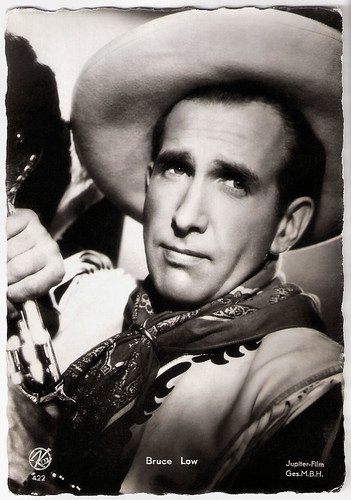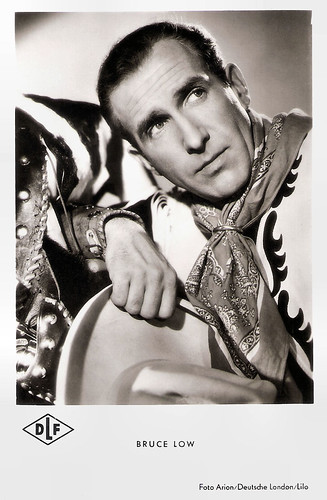
Austrian postcard by Kellner Postkarten, Wien (Vienna), no. 422. Photo: Jupiter-Film Ges.M.B.H. Bruce Low in Geld aus der Luft/Money from the air (Géza von Cziffra, 1954).

West-German promotion card by Ariola.
Blackface
Bruce Low was born Ernst Gottfried Bielke on a coffee plantation in Paramaribo, Surinam - then part of The Netherlands in 1913. He spent his childhood in Surinam together with his three sisters and brother. Their father, Hermann Moritz Bielke, worked as a missionary with the Herrnhuter Brüdergemeine. Their mother Lydia née Reusch was born in Hong Kong, her father came from Württemberg and was also a missionary.
From 1921, Bruce attended grammar school in Zeist, the Netherlands, played tenor saxophone in the school jazz band and was a member of the local church choir. After his final exams in 1932, he studied sports at the Deutsche Hochschule für Leibesübungen (DHfL - German University of Physical Education) in Berlin. But a serious injury while trampolining put an end to his studies as a sports teacher. Instead, he took singing lessons from the singing teacher Jacques Stückgold at the Hochschule für Musik (now Universität der Künste Berlin / Berlin University of the Arts). Low continued his studies in the Netherlands and also sang in a chamber choir.
His performing career only took shape after the war. He organised shows for the Americans in the Netherlands, contracted music groups, was an emcee and sang spiritual songs, also for the radio. As a result, he was hired in 1949 for a show with African folk songs in Vienna. He appeared in front of the audience dressed as a black man with blackface in the Al Johnson manner and received an offer for a recording contract. His first records contained Western-style cowboy songs, such as '(Ghost) Riders in the Sky' and 'Heimweh nach Virginia' (Homesick for Virginia).
In 1950, the man with the sonorous bass voice had his first success in Germany with the song 'Leise rauscht es am Missouri' (The Missouri River Rumbles Quietly). In 1953, more hits followed, such as 'So viel Wind und keine Sege' (So Much Wind and No Sail) and his legendary 'Tabak und Rum' (Tobacco and Rum). Two years later, 'Das alte Haus von Rocky Docky', the cover version of 'This Ole House' became a box office hit.
In 1956 he took third place in the newly created German Hit Parade with 'Wenn die Sonne scheint in Texas' (When the sun shines in Texas) and climbed to second place with 'Und es weht der Wind' (And the wind blows). His interpretation of the legendary hit 'Es hängt ein Pferdehalfter an der Wand', a cover version of Carson Robison's song 'There's a Bridle Hangin' on the Wall', with which the Dutch band Kilima Hawaiians had already caused a furore in Germany in 1953, became his greatest success.

Vintage postcard. Photo: Real Film.

Dutch photo.
A wonderful one night at the airport film
In 1958 Bruce Low took part in the preliminaries for the Eurovision Song Contest in the Netherlands, with 'Neem Dat Maar Aan Van Mij' (Take That From Me) but came in 10th. Bruce Low also made several guest appearances as a singer in the popular German-language musical entertainment films of the 1950s and 1960s.
These films included Königin der Arena/Queen of the Arena (Rolf Meyer, 1952) with Maria Litto and Hans Söhnker, Wenn am Sonntagabend die Dorfmusik spielt/When The Village Music Plays on Sunday Nights (Rudolf Schündler, 1953) starring Rudolf Prack, and the operetta adaptation Blume von Hawaii/The Flower of Hawaii (Géza von Cziffra, 1953) starring Maria Litto.
He also performed his hit songs in several Schlager films. As an actor, he appeared in the successful drama Die endlose Nacht/The Endless Night (Will Tremper, 1963) a wonderful one-night-at-the-airport film with Karin Hübner and Harald Leipnitz.
He later also appeared in two other films by Tremper, the comedy Sperrbezirk/Sperrbezirk, the business of immorality (Will Tremper, 1966) with Harald Leipnitz and Mir hat es immer Spaß gemacht/How Did a Nice Girl Like You Get Into This Business? (Will Tremper, 1970) starring Playboy bunny Barbi Benton and Broderick Crawford.
After the stage musical 'Kiss me Kate' in the German translation by Marcel Prawy became an extraordinary success in the Wiener Volksoper, Prawy went to work on the Leonard Bernstein musical 'Wonderful Town' (1956), also in the Wiener Volksoper. Bruce Low played the lead role of Bob Baker as Olive Moorefield's partner.

West-German postcard by Kunst und Bild, Berlin, no. A 1119. Photo: Arion / Deutsche London / Lilo. Bruce Low in Geld aus der Luft/Money from the air (Géza von Cziffra, 1954).

German postcard by F.J. Rüdel, Filmpostkartenverlag, Hamburg-Bergedorf, no. 537. Photo: Studio Lili Scholz / Polydor-Schallplatten.
Eurovision Song Contest
The advancing rock and roll wave seemed to end his career, so Bruce Low started writing articles for the Munich magazine Jasmin under the pseudonym Thomas Gallauner. At the Karl May Festival in Berlin he portrayed Old Shatterhand in 'Winnetou' (1966) and 'Der Schatz im Silbersee' (1968), alongside Gustavo Rojo as Winnetou.
At the beginning of the 1970s, his voice was in demand again and he performed mainly new, partly traditional gospels. With songs such as 'Noah' (1971), 'Das Kartenspiel' (1974) and 'Die Legende von Babylon' (1978), he hit the charts once more. He appeared as a guest in several television broadcasts and was asked as a presenter for circus broadcasts.
He also had several appearances in the ZDF quiz show Der große Preis. He returned to the cinemas in several films by Rainer Werner Fassbinder. First, he played in the TV two-parter Welt am Draht/World on a Wire (Rainer Werner Fassbinder, 1973) and later in the films Faustrecht der Freiheit/Fox and His Friends (Rainer Werner Fassbinder, 1975) and Die Ehe der Maria Braun/The Wedding of Maria Braun (Rainer Werner Fassbinder, 1979) starring Hanna Schygulla.
In 1976 he participated again in the preliminaries of the Eurovision Song Contest, now in West Germany, with the song 'Der Jahrmarkt unserer Eitelkeit' (The Fair of Our Vanity). However, he only reached 9th place among twelve participants and the Les Humphries Singers participated for Germany with 'Sing Sang Song' and reached 12th place. In the 1980s it became quieter again around the singer.
Two years before his death, he published his memoirs under the title 'Es hängt ein Pferdehalfter an der Wand - das Lied meines Lebens' (There is a horse halter hanging on the wall - the song of my life). In 1990, Bruce Lowe died after a long illness at the age of 76 in a Munich hospital. At his own request, the artist, who was married to his wife Marion, had his body cremated and scattered in a meadow in the Netherlands.

West-German postcard by top-Schlagertextheft. Photo: Ariola.
Sources: Stephanie D'Heil (Steffi-Line - German), Wikipedia (Dutch and German), and IMDb.
No comments:
Post a Comment